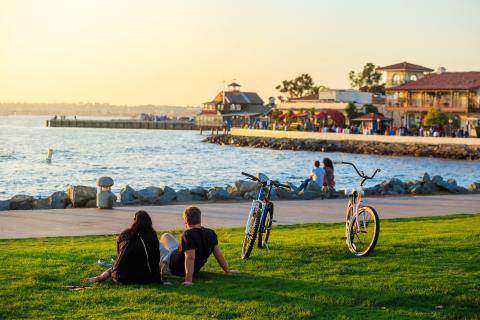Over the next century San Diego’s population will double to 3 million in the city and 7 million in the county. How will all these people — our children, grandchildren, and great-grandchildren — enjoy our most sacred natural resource — our waterfronts — if we continue to wall them off from public access?
San Diego Bay is now almost completely inaccessible. Think about it: where can you dangle your feet in the bay?
Mission Bay is rapidly following suit.
California’s tidelands are legally protected for the public under California Constitution, Article X, section 4, and yet, our politicians are subverting this at every turn — for the financial benefit of hoteliers.
The Takeover
The Bahia Hotel in Mission Bay is a prime example of what is happening. It is owned by Evans Hotels and sits on leased public tidelands.
The company is seeking to maximize density by doubling the hotel’s size. The plan calls for eliminating Gleason Road, 270 public parking spaces, and the grassy areas used by the public, while extending the hotel lease boundaries to the north and east. This will eliminate access for small boat users and picnickers along a one-third mile section of Mission Bay Park. The goal seems to be to effectively turn Bahia Point into a private beach for hotel guests, while permanently sealing off public use.
Evans Hotels is also pushing a joint-hotel project with SeaWorld on tidelands to the east, further permanently walling off public access to the bay. See a pattern? Evans and Bartell Hotels are replicating this strategy in Point Loma, Shelter Island and Harbor Island as well.
However, the most egregious hotelier-driven, walling-off-the-waterfront proposals arguably include the downtown Convention Center expansion and the Gaylord Convention Center in Chula Vista.
Hoteliers Don't Drive Tourism
Although we are the 8th largest city in the United States, The Trust for Public Land ranks San Diego 16th in public parks and 43rd in neighborhood dog parks. Necessity suggests that our priority should be more parks on our tidelands, not more hotels.
Furthermore, why do convention centers need to be on our waterfront anyway? Have you ever seen conventioneers wading or kayaking at the Convention Center? I haven’t.
Hoteliers are carving our public tidelands like a Thanksgiving turkey — yet hoteliers are the only ones feasting.
Our political leaders are simultaneously lapping up hotelier donations, while wink, wink, pretending that hoteliers drive local tourism. Truth is, hoteliers don’t drive San Diego’s tourism business, and never have.
Protecting San Diego’s Waterfront
To prevent further hotelier encroachment, every last square inch of public tidelands should be brought under a new San Diego Tidelands Park designation. Once protected, we can pursue a bold new path — one that orients our bays to the public and turns San Diego into the greatest outdoor sporting city in the world.
Sports-tourism is a highly desirable business. As hotelier lobbyist Mike McDowell and Tourism Authority CEO Joe Terzi penned in 2016, “only Comic-Con fills more San Diego hotel rooms than youth soccer tournaments.”
Tiny Barstow has built more baseball fields than almost anywhere else, establishing a booming youth baseball tourism business.
Youth soccer and youth baseball are great tourism assets, but they pale in comparison to the sports-tourism opportunity in front of San Diego today — and it is breathtaking.
Imagine The Possibilities
Consider the imagination it took to create New York City’s High Line park — and what an incredible tourism draw it has become in only four years. We can and should do the same.
San Diego is already a training destination for world-class athletes due to our unmatched, incredible year-round weather. So let’s play into this strength while significantly broadening our land and water-based sports appeal. Doing so will attract Olympians, tri-athletes, iron men and amateur sporting enthusiasts alike.
The vision is to erect 12 public boat houses at strategic tideland points throughout San Diego Bay and Mission Bay for small, non-motorized watercraft — kayaks, paddleboards, rowing shells, windsurfers, sunfishes, surfboards, etc. The locations would be Imperial Beach, Glorietta Bay (already built), Coronado Landing, Chula Vista, the downtown Convention Center, downtown Harborview, Harbor Island, Shelter Island, Liberty Station, Bahia Point, Santa Clara Point (already built) and Fiesta Island.
In conjunction, we would establish multiple tideland discovery and picnicking destinations for water athletes, while integrating hiking, biking and running trails for land athletes. We would nickname these locations to spark our collective imaginations like Tom Sawyer Island at Disneyland does. Perhaps Robinson Crusoe Beach on the north side of Coronado’s Crown Cove, and Treasure Island on north Fiesta Island.
Think of the cutting-edge water races San Diego could sponsor year-round — professional, amateur, high school and age-based. Perhaps we could name them the San Diego Bay-to-Bay Challenge? Imagine swimmers and every type of non-motorized watercraft — racing in classes –– beginning in Imperial Beach, crossing nine bay stations, reaching Liberty Station, running and biking to Bahia Point, crossing three bay stations, and finishing at north Fiesta Island.
In short order, San Diego could become “the” destination for professional and amateur athletes to train and compete, as well as families seeking unique outdoor sporting experiences.
This is what being the City of Life / Ciudad de Vida is all about –– imaginatively living life to its fullest.
George Mullen is spearheading City of Life, which aims to build and project a global brand for San Diego. He is principal of StudioRevolution.com and a native of San Diego.
